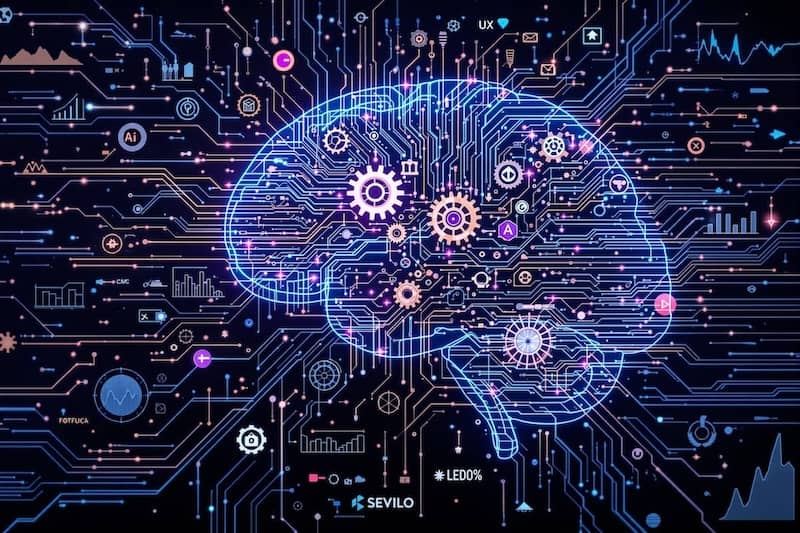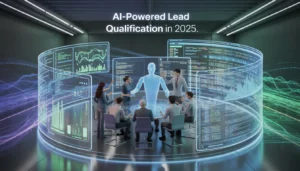
gusnatø
- March 19, 2025
- AI Summary
In today’s rapidly evolving business landscape, organizations are increasingly turning to artificial intelligence solutions to maintain competitive advantage. AI business agents represent a transformative technology that’s reshaping how companies operate, interact with customers, and manage internal processes. Recent studies show that 67% of enterprises have accelerated their AI adoption in the past year, with intelligent conversational AI solutions leading the transformation.
Understanding AI Business Agents
Definition and Core Concepts
AI business agents are sophisticated software systems that combine artificial intelligence, machine learning, and natural language processing to perform complex business tasks autonomously. These agents serve as intelligent digital workers, capable of:
- Processing and analyzing large amounts of data
- Making informed decisions based on predetermined parameters
- Interacting naturally with humans through various interfaces
- Learning and improving from experience
- Executing complex business processes automatically
Types of AI Business Agents
| Agent Type | Primary Function | Key Benefits | Implementation Complexity |
|---|---|---|---|
| Conversational Agents | Customer Service & Support | 24/7 availability | Medium |
| Process Automation Agents | Workflow Management | Increased efficiency | High |
| Analytics Agents | Data Analysis & Reporting | Real-time insights | Medium-High |
| Decision Support Agents | Strategic Planning | Enhanced decision-making | High |
| Sales & Marketing Agents | Lead Generation | Improved conversion rates | Medium |
Technical Architecture
AI business agents rely on Natural Language Processing (NLP) for nuanced communication, Machine Learning (ML) for adaptation and performance improvement, Knowledge Representation and Reasoning (KRR) for intelligent decision-making, and a robust software architecture ensuring scalability, reliability, and security.
These components must work together harmoniously to create an AI business agent that is truly intelligent, effective, and capable of driving real business value.
Natural Language Processing (NLP) Engine
- Language understanding modules
- Context Interpretation
- Sentiment analysis
- Multi-language support
Machine Learning Core
- Pattern recognition
- Predictive analytics
- Adaptive learning
- Behavioural modeling
Integration Layer
- API management
- Data synchronization
- Security protocols
- Legacy system compatibility
The Impact of AI Agent Automation on Business Operations

AI Business Agents: The Future of Automation for Enhanced Efficiency and Productivity
Modern businesses implementing automated customer service solutions have reported significant improvements:
Reduced Response Times: AI agents can provide instant answers to common queries, eliminating wait times for customers and freeing up human agents to handle more complex issues.
- 24/7 Availability: Unlike human employees, AI agents can operate around the clock, ensuring continuous customer support and service delivery regardless of time zones or business hours.
- Increased Throughput: Automated systems can handle a higher volume of interactions simultaneously, leading to greater efficiency and reduced backlogs.
Cost Reduction and Resource Optimization: Beyond efficiency gains, AI agent automation offers considerable cost-saving opportunities:
- Lower Labor Costs: By automating routine tasks, businesses can reduce their reliance on human labor, leading to lower salary expenses, benefits, and training costs.
- Reduced Operational Expenses: AI agents can optimize resource allocation, leading to reduced expenses in areas like call center infrastructure, office space, and utilities.
- Improved Resource Utilization: AI can analyze data to predict demand and allocate resources accordingly, ensuring that staff are deployed efficiently and that resources are not wasted.
Improved Customer Experience: AI agent automation can also enhance the customer experience in several ways:
- Personalized Interactions: AI agents can analyze customer data to provide personalized recommendations, tailored solutions, and proactive support.
- Consistent Service Quality: AI agents deliver consistent and reliable service, eliminating the variability that can occur with human agents due to fatigue, mood, or skill level.
- Seamless Omnichannel Experience: AI agents can seamlessly integrate across various communication channels, such as phone, email, chat, and social media, providing customers with a consistent experience regardless of their preferred channel.
Enhanced Data Insights and Decision Making: The data generated by AI agent’s interactions provides valuable insights that can inform business decisions:
- Identify Customer Pain Points: By analyzing customer interactions, businesses can identify common pain points and areas for improvement in their products, services, or processes.
- Predict Customer Behavior: AI can analyze data to predict customer behavior, enabling businesses to proactively address potential issues and tailor their offerings to meet customer needs.
- Optimize Marketing Campaigns: Data insights from AI agents can be used to optimize marketing campaigns, target the right audience, and improve conversion rates.
Scalability and Flexibility: AI agent automation allows businesses to scale their operations quickly and efficiently:
Expand into New Markets: AI agents can be easily adapted to support new languages and cultures, enabling businesses to expand into new markets without significant investment in human resources.
Rapidly Deploy New Agents: AI agents can be deployed quickly and easily to meet changing business needs, without the need for extensive training or onboarding.
Adapt to Fluctuating Demand: AI agents can automatically scale up or down to accommodate fluctuations in demand, ensuring that businesses can always provide adequate support and service.
Automated Task Execution
- 70% reduction in manual processes
- 85% faster transaction processing
- 99.9% accuracy in routine tasks
Workflow Optimization
- 45% reduction in process bottlenecks
- 60% improvement in resource allocation
- 40% decrease in operational delays
Cost Impact Analysis
| Cost Category | Average Reduction | Implementation Timeline |
|---|---|---|
| Operational Costs | 25-40% | 3-6 months |
| Labor Costs | 30-50% | 6-12 months |
| Error-Related Costs | 80-95% | 1-3 months |
| Training Costs | 40-60% | 3-9 months |
Industry-Specific Applications

Financial Services
Risk Assessment Machine learning models are increasingly used to predict credit risk, fraud detection, and market volatility. These models analyze vast datasets of financial transactions, market data, and customer information to identify patterns and anomalies that indicate potential risks.
For example, in credit risk assessment, algorithms can predict the likelihood of a borrower defaulting on a loan, enabling lenders to make more informed lending decisions. In fraud detection, machine learning models can identify suspicious transactions in real time, preventing financial losses.
Risk Assessment
- Credit scoring automation
- Fraud detection
- Compliance monitoring
Customer Service
- Account management
- Transaction processing
- Investment advisory
Healthcare and AI
AI agents are poised to significantly transform the healthcare sector, improving efficiency, accuracy, and patient outcomes across a variety of applications. Here’s how:
Diagnosis and Treatment Planning: AI agents can analyze vast amounts of medical data, including patient history, imaging scans, and lab results, to assist clinicians in making faster and more accurate diagnoses. They can identify patterns and anomalies that might be missed by human doctors, leading to earlier detection of diseases like cancer and more effective treatment plans. Furthermore, AI agents can personalize treatment plans based on individual patient characteristics and preferences, optimizing efficacy and minimizing side effects.
Drug Discovery and Development: The process of discovering and developing new drugs is lengthy and expensive. AI agents can accelerate this process by analyzing biological data, predicting the efficacy of potential drug candidates, and identifying promising targets. They can also optimize clinical trial design and analyze trial data to identify patterns and predict patient responses, ultimately reducing the time and cost associated with bringing new drugs to market.
Personalized Medicine and Patient Monitoring: AI-powered virtual assistants can provide patients with personalized health recommendations, reminders for medication adherence, and support for managing chronic conditions. Wearable devices and remote monitoring systems, combined with AI agents, can track vital signs and other health data, alerting healthcare providers to potential problems before they escalate. This proactive approach to patient care can improve outcomes and reduce hospital readmissions.
Administrative Tasks and Efficiency: AI agents can automate many of the routine administrative tasks that burden healthcare providers, such as scheduling appointments, processing insurance claims, and managing medical records. This frees up healthcare professionals to focus on patient care, improves efficiency, and reduces administrative costs. AI-powered chatbots can also answer patient inquiries, provide information about services, and guide patients through the healthcare system, improving the patient experience.
Robotics and Surgery: AI agents can enhance the capabilities of surgical robots, providing surgeons with greater precision, dexterity, and control. They can also assist in pre-operative planning by analyzing imaging data and creating 3D models of the surgical site. In some cases, AI-powered robots can even perform certain surgical tasks autonomously, under the supervision of a human surgeon.
Mental Healthcare: AI-powered chatbots and virtual therapists can provide patients with access to mental healthcare services, particularly in areas where there is a shortage of mental health professionals. These AI agents can offer support for managing anxiety, depression, and other mental health conditions, providing a safe and confidential space for patients to talk about their concerns.
Public Health and Pandemic Response: AI agents can analyze data from multiple sources, including social media, news reports, and public health databases, to identify outbreaks of infectious diseases and track their spread. They can also be used to model the impact of different interventions, such as vaccinations and social distancing, helping public health officials make informed decisions about how to respond to pandemics.
Patient Care
- Appointment scheduling
- Treatment follow-up
- Medical record management
Administrative Tasks
- Insurance verification
- Billing automation
- Inventory management
Retail and E-commerce
AI agents in the retail and e-commerce sector are software programs designed to autonomously perform tasks, make decisions, and interact with systems and customers to improve efficiency, personalize experiences, and increase revenue. They operate based on pre-defined rules, machine learning algorithms, and natural language processing (NLP) capabilities. Here’s a breakdown of their applications:
Customer Service & Support:
- Chatbots: Handle customer inquiries through text or voice, providing instant answers to FAQs, resolving simple issues (e.g., order tracking, return initiation), and escalating complex cases to human agents. They leverage NLP to understand customer intent and provide relevant responses, improving customer satisfaction and reducing support costs.
- Virtual Assistants: More sophisticated than chatbots, offering proactive support and personalized recommendations. They can learn customer preferences, anticipate needs (e.g., suggesting product refills), and provide tailored advice based on past purchases and browsing history.
- Sentiment Analysis Agents: Analyze customer reviews, social media posts, and support interactions to identify customer sentiment and brand perception. This helps retailers understand areas for improvement and address negative feedback promptly.
Personalization & Recommendations:
- Recommendation Engines: Analyze customer data (purchase history, browsing behavior, demographics) to suggest products that are likely to be of interest. They use collaborative filtering, content-based filtering, and hybrid approaches to optimize recommendations and increase sales.
- Personalized Marketing Agents: Create and deliver targeted marketing campaigns based on individual customer profiles. They can personalize email marketing, display advertising, and website content to increase engagement and conversion rates.
- Dynamic Pricing Agents: Adjust prices in real-time based on market demand, competitor pricing, and inventory levels. They use machine learning algorithms to optimize pricing strategies and maximize revenue.
Inventory Management & Supply Chain:
- Demand Forecasting Agents: Predict future demand for products based on historical sales data, seasonality, trends, and external factors (e.g., weather, economic conditions). This helps retailers optimize inventory levels, reduce stockouts, and minimize waste.
- Supply Chain Optimization Agents: Automate and optimize supply chain processes, such as order fulfillment, warehouse management, and logistics. They can identify bottlenecks, optimize routing, and reduce transportation costs.
- Automated Procurement Agents: Automate the process of sourcing and purchasing goods from suppliers. They can identify the best suppliers, negotiate prices, and manage purchase orders, reducing procurement costs and improving efficiency.
Fraud Detection & Security:
- Fraud Detection Agents: Analyze transactions and user behavior to identify fraudulent activities, such as credit card fraud, account takeover, and fake reviews. They use machine learning algorithms to detect anomalies and prevent fraud, protecting both the retailer and its customers.
- Cybersecurity Agents: Monitor network traffic and system logs to detect and prevent cyberattacks. They can identify suspicious activity, block malicious traffic, and alert security personnel to potential threats.
Merchandising & Visual Search:
- Visual Search Agents: Allow customers to search for products using images. They use computer vision to identify the objects in an image and find similar products in the retailer’s inventory. This improves the customer experience and makes it easier to find desired items.
- Automated Merchandising Agents: Analyze product performance, customer behavior, and market trends to optimize product placement, pricing, and promotions. They can automatically adjust website layouts and product listings to maximize sales.
Key Benefits:
- Improved Customer Experience: Personalized recommendations, instant support, and streamlined processes enhance customer satisfaction and loyalty.
- Increased Efficiency: Automation of tasks and optimization of processes reduce costs and improve operational efficiency.
- Higher Revenue: Personalized marketing, dynamic pricing, and optimized inventory management drive sales and increase profitability.
- Reduced Costs: Automation of tasks, fraud prevention, and efficient supply chain management reduce operational expenses.
- Data-Driven Decision Making: AI agents provide valuable insights into customer behavior, market trends, and operational performance, enabling data-driven decision making.
Challenges:
- Data Requirements: AI agents require large amounts of high-quality data to train and operate effectively.
- Integration Complexity: Integrating AI agents with existing systems can be complex and time-consuming.
- Ethical Considerations: AI agents can raise ethical concerns related to privacy, bias, and fairness.
- Explainability and Transparency: Understanding how AI agents make decisions can be challenging, which can limit trust and adoption.
- Maintenance and Updates: AI agents require ongoing maintenance and updates to ensure accuracy and effectiveness.
The retail and e-commerce sector is rapidly evolving, and AI agents are playing an increasingly important role in driving innovation and growth. As AI technology continues to advance, we can expect to see even more sophisticated and impactful applications of AI agents in this sector.
Implementation of AI-powered lead generation systems has shown:
Customer Engagement
- 300% increase in response rates
- 45% improvement in customer satisfaction
- 60% reduction in response time
Inventory Management
- 40% reduction in stockouts
- 35% improvement in inventory turnover
- 25% decrease in carrying costs
AI Business Agent Case Studies: Efficiency, ROI & Savings
Enterprise Implementation Success Stories
Case Study 1: Global Financial Institution
- Challenge: Customer service scalability
- Solution: AI agent implementation
- Results:
- 85% reduction in response time
- 90% customer satisfaction
- $4.5M annual savings
Case Study 2: Healthcare Provider Network
- Challenge: Patient scheduling efficiency
- Solution: Automated scheduling system
- Results:
- 75% reduction in no-shows
- 45% increase in appointment capacity
- 95% patient satisfaction rate
Implementation Strategy
Comprehensive Deployment Framework
Assessment Phase (2-4 weeks)
- Business needs analysis
- Process mapping
- Technology evaluation
- ROI projection
Planning Phase (4-6 weeks)
- Solution design
- Resource allocation
- Timeline development
- Risk assessment
Implementation Phase (8-12 weeks)
- System integration
- Testing and validation
- User training
- Performance monitoring
Optimization Phase (Ongoing)
- Performance analysis
- System refinement
- Feature enhancement
- User feedback integration
ROI Calculation Methods
| Metric | Calculation Method | Typical Range |
|---|---|---|
| Cost Savings | (Previous Costs – New Costs) / Implementation Costs | 150-300% |
| Productivity Gain | (New Output – Previous Output) / Previous Output | 40-80% |
| Error Reduction | (Previous Errors – New Errors) / Previous Errors | 80-95% |
| Time Savings | (Previous Time – New Time) / Previous Time | 50-70% |
Best Practices and Considerations
Security and Compliance
Data Protection
- Encryption protocols
- Access control systems
- Regular security audits
- Compliance monitoring
Risk Management
- Backup systems
- Disaster recovery
- Business continuity planning
- Regular risk assessments
Change Management
Employee Training
- Skill assessment
- Training programs
- Performance monitoring
- Continuous education
Communication Strategy
- Stakeholder engagement
- Progress reporting
- Feedback collection
- Success celebration
Future Trends and Innovations

Emerging Technologies
For AI business agents evolving with new technologies:
Key Areas of Focus:
- Advancements in Natural Language Processing (NLP): AI agents need to understand and generate human language more fluently and contextually. This involves:
- Better understanding of nuances, sentiment, and intent: Moving beyond simple keyword recognition to grasp the underlying meaning of customer inquiries and internal communications.
- Multilingual capabilities: Supporting interactions in multiple languages seamlessly.
- Contextual awareness across conversations: Remembering past interactions to provide personalized and relevant assistance.
- Improved natural language generation (NLG): Creating more human-like and engaging responses.
- Improved Machine Learning (ML) and Deep Learning (DL) Models: Enhancing the ability of AI agents to learn from data, predict future outcomes, and make intelligent decisions. This includes:
- Reinforcement learning: Training agents through trial and error to optimize their performance in complex tasks, such as negotiation or resource allocation.
- Federated learning: Training models on decentralized data sources without compromising privacy, enabling broader data access and improved accuracy.
- Explainable AI (XAI): Making the decision-making processes of AI agents more transparent and understandable, building trust and enabling better oversight.
- Robotic Process Automation (RPA) Integration: Combining AI agents with RPA to automate repetitive tasks and streamline workflows. This involves:
- AI-powered RPA: Using AI to identify and automate more complex tasks that require cognitive abilities.
- Intelligent automation: Creating end-to-end automation solutions that combine AI, RPA, and other technologies.
- Computer Vision and Image Recognition: Enabling AI agents to “see” and interpret visual data, expanding their applications to areas like inventory management, quality control, and security.
- Edge Computing: Processing data closer to the source, reducing latency and improving the real-time responsiveness of AI agents. This is especially important for applications that require immediate action, such as autonomous vehicles or robotic manufacturing.
- Quantum Computing (Long-Term): While still in its early stages, quantum computing has the potential to revolutionize AI by enabling the development of more powerful and efficient algorithms.
- Blockchain Integration: Ensuring secure and transparent transactions, managing digital identities, and building trust in AI agent interactions.
- Personalization Technologies: Utilizing data and AI to tailor interactions and services to individual user needs and preferences. This includes:
- Predictive analytics for personalized recommendations: Anticipating customer needs and offering proactive support.
- Dynamic content generation: Creating customized content based on user profiles and behaviors.
- AI Ethics and Governance: Addressing the ethical implications of AI and ensuring that AI agents are used responsibly and fairly. This includes:
- Bias detection and mitigation: Identifying and correcting biases in training data and algorithms.
- Data privacy and security: Protecting user data and ensuring compliance with privacy regulations.
- Accountability and transparency: Establishing clear lines of responsibility for the actions of AI agents.
Implications for AI Business Agents:
- Expanded Role: AI agents will move beyond simple tasks like answering FAQs to handle more complex and strategic responsibilities.
- Increased Efficiency: AI agents will automate more tasks, freeing up human employees to focus on higher-value activities.
- Improved Customer Experience: AI agents will provide more personalized and responsive service to customers.
- Data-Driven Decision Making: AI agents will provide businesses with valuable insights that can be used to improve decision-making.
- New Business Models: AI agents will enable businesses to create new products and services that were not previously possible.
- Competitive Advantage: Businesses that adopt and effectively utilize these emerging technologies will gain a significant competitive advantage.
AI business agents evolve to become more intelligent, versatile, and ethical, enabling them to play a critical role in the future of business. It requires a constant process of learning, adaptation, and innovation.
Advanced AI Capabilities
- Emotional intelligence
- Contextual understanding
- Autonomous decision-making
- Predictive analytics
Integration Developments
- Cross-platform compatibility
- API advancement
- Cloud integration
- Mobile Optimization
Market Predictions for AI Business Agents
- 300% growth in AI agent adoption by 2025
- 70% of enterprises implementing AI agents
- $50B market value by 2026
- 45% CAGR in the next five years
Frequently Asked Questions
What is an AI business agent?
An AI business agent is an intelligent software system that automates complex business tasks using artificial intelligence and machine learning technologies.
How do AI agents improve business efficiency?
They automate routine tasks, reduce errors, provide 24/7 availability, and enable faster decision-making processes.
What is the cost of implementing AI business agents?
Costs vary depending on scope and complexity, but typical implementations range from $50,000 to $500,000+.
How long does it take to implement AI business agents?
Implementation typically takes 3-6 months, depending on the complexity and scale of the solution.
What types of businesses can benefit from AI agents?
Organizations of all sizes across industries can benefit, particularly those with high-volume processes or customer interactions.
How secure are AI business agents?
Modern AI agents incorporate advanced security measures, including encryption, access controls, and compliance frameworks.
What ROI can businesses expect?
Typical ROI ranges from 25-300% within the first year, depending on implementation scope and efficiency gains.
How do AI agents learn and improve?
Through machine learning algorithms that analyze patterns, feedback, and outcomes to enhance performance over time.
What maintenance is required?
Regular updates, performance monitoring, and periodic optimization are necessary for optimal operation.
Can AI agents replace human workers?
AI agents typically augment human capabilities rather than replace them, enabling employees to focus on higher-value tasks.







